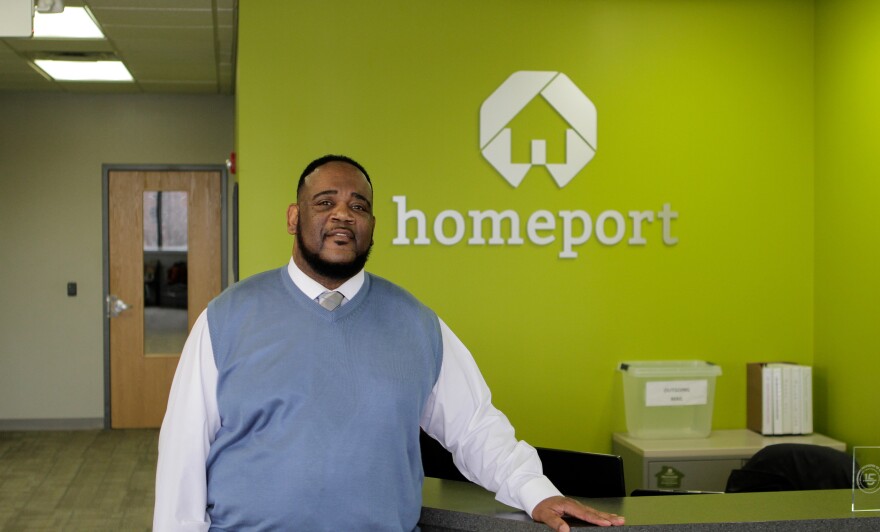This is the second of a two-part series on affordable housing in Columbus. Read part one here.
On a recent Saturday morning, bleary-eyed prospective homeowners bundled in winter coats piled into a classroom at Homeport in northeast Columbus. Kerrick Jackson, who leads the course, opens with a question: How do you get downtown?
After a few volunteers offer examples, he jumps back in.
“In this home buying process, you’ll start understanding, you’ll start hearing people say, 'Well, I did it this way, I didn’t do it that way,'” Jackson says. “But the overall goal in getting downtown is to get downtown, right? The overall goal in home ownership is what? To purchase this home.”
The non-profit developer is one of a handful of agencies offering classes on the home buying process—a class that's necessary for potential buyers to qualify for down payment assistance.
Columbus Department of Development director Steve Schoeny explains the city works on affordable housing in a number of ways.
“Sometimes all the threads feel like they make an ugly Christmas sweater,” he says.
There's often a lot of confusion over what "affordable housing" means. True "affordable housing" means that people who qualify as low-income—which the federal government defines as earning 20 percent less than a typical area family—can afford to pay rent and utilities on just a third of their earnings.
In Columbus, affordable housing should cost about $1,500 a month for a family of four.
The federal Department of Housing and Urban Development (HUD) estimates more than 400,000 Columbus residents qualify as low-income. And there's not enough affordable housing to go around. Studies suggest Columbus needs to build about 54,000 more units to meet current demand.
"We will not subsidize our way to housing affordability. It will not happen," Schoeny says. "What we have is a mismatch of supply and demand."

Buying the home is one thing; keeping it is another. Columbus housing administrator Rita Parise explains that, particularly for seniors, assistance maintaining a home can be critically important.
“The furnace goes, the roof goes, there are other issues, basement walls start bowing,” Parise says. “Which is never a good day for an adult homeowner, but is a horrible day for a retired homeowner on a very fixed income.”
In terms of obtaining housing, the city serves renters by helping developers secure federal tax credits for affordable housing projects. It also funds rental assistance through the Community Shelter Board for people who are homeless or at risk of losing their home.
But for people purchasing homes, the city offers a down payment assistance program known as the American Dream Downpayment Initiative, utilizing money from HUD. It’s a big reason why people came out to Homeport on a snowy Saturday morning.
Maggie Parks showed up at her first class about a year ago. She closed on her house in Milo Grogan last September, just in time to host family for Thanksgiving and Christmas.
“I did all the fixings,” she says. “Just everything, like turkey, dressing, ham, sweet potatoes, green beans, mashed potatoes, just like the whole smorgasbord of it all.”
Parks qualified for help with her down payment after spending six months working to improve her credit. The home she bought used to be part of Homeport’s lease-to-own program.
She recalls when her credit counselors brought up the opening.
“Yeah, we’ve got this house—four bedrooms, one and a half bath, one car garage—and I was like, 'Oh, ok, what’s the catch?' It’s like, no, there’s no catch," Parks says. "It was kind of hard to believe at first.”
Earlier this month, the city announced the creation of a community land trust in partnership with the Franklin County land bank. John Turner, who administers the city’s land redevelopment office, explains how the $3.8 million investment will work.
“So we work with development partners, who would fund the construction of the house, and then we would have our funds go in at the end of the project to the developer to make that house affordable by buying down the purchase price to the buyer,” Turner says.
The money comes from unused demolition funds left over in the agency’s budget, and although money flows first to homebuilders, Turner explains there’s a good reason for that.
“So it’s important that the subsidy go to the developer, because it may be taxable income to the buyer," Turner says.
Under the land trust model, buyers will own the home, but the trust will own the land beneath. When the homeowners eventually sells the home, they’ll leave with their down payment, any equity they’ve built up and a portion of the home’s appreciation. Because the trust maintains ownership of the land, it can ensure the home remains affordable for future buyers.
If you have questions about how affordable housing works in Columbus, or if you have a story to share, contact WOSU at nick.evans@wosu.org.







